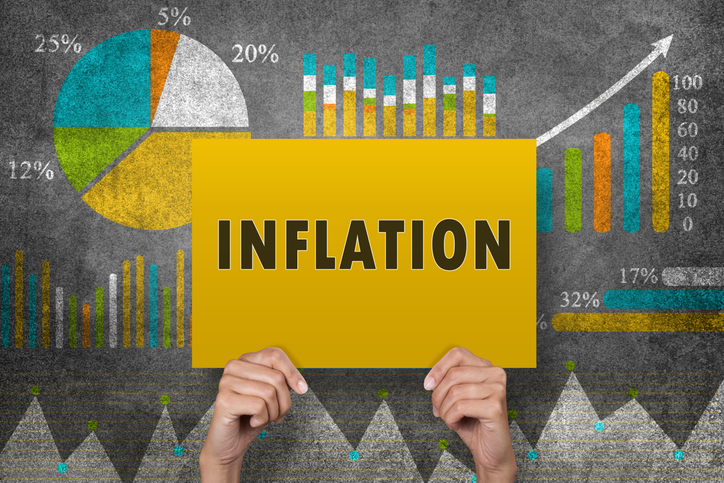Global View Investment Blog
Inflation and Your Retirement Plan
It’s been a while since inflation has been in the news, but don’t kid yourself – the scourge of inflation can and will return some time in the future. The question is how inflation will diminish the value of your retirement nest egg. And even more importantly, what you can do now to guard against inflation’s return.
Understanding Inflation
Inflation is an economic term that describes a general increase in prices coupled with a reduction in money’s purchasing power.
In the United States, the Consumer Price Index (CPI), produced by the Bureau of Labor Statistics, is how we measure inflation. It calculates the rate of inflation by surveying 23,000 businesses and 80,000 consumer items each month. The Personal Consumption Expenditures Index is a broader inflation measure, incorporating additional items such as the cost of healthcare services paid by health insurance.
It’s important to understand that the inflation rate is a rate of growth. For example, suppose the inflation rate in Year One was 3 percent, and 2 percent in Year Two. In this case, prices didn’t decline by one percentage point in the second year. Rather, the decrease indicates that the rate of growth fell by one percent, but prices did indeed increase in Year Two, by 2 percent.
What this all boils down to is, retiring in Greenville, SC (or anywhere else, for that matter) will cost more in 30 years than it does now. Does your retirement plan account for that?
The Impact of Inflation
When prices go up, your money buys less. That’s always a concern, but the problem is more acute for retirees who are living on a fixed income. Without remedial action, retirees would see their living standards deteriorate over time as they found it harder to buy the things they need. Moreover, if retirees have to spend more each year than anticipated, the chances increase that they will outlive their money.
The government recognizes this problem and indexes Social Security benefits to the rate of inflation. In the last few years, inflation has been low, so the Social Security Cost Of Living Adjustments (COLAs) have been small – in some years, there has been no adjustment at all.
The indexing of Social Security benefits to inflation certainly helps retirees cope with rising prices. But it shouldn’t be the only line of defense.
Remember, Social Security benefits will make up only a small portion of your retirement income, especially if you’re looking at a high net worth retirement. Therefore, it’s important to have other strategies to protect your retirement funds and investments against inflation.
The Role of Life Expectancy
Clearly, the actions you take to preserve the buying power of your retirement funds should take into account how long you expect your retirement to last. In 2019, the pre-pandemic average life expectancy of the U.S. population was 78.8 years. It dipped in 2020 due to COVID-19, but it’s a good bet it will resume its upward climb as the pandemic recedes.
Average age expectancy is just that, an average. If you retire at age 65 and live until age 95, you have the task of preserving your money over a 30-year period, including protecting it from inflation. Taking this a step further, your estate plan should be flexible enough to handle a wide range of life expectancies so that your heirs are protected from inflation too.
Healthcare
Not all costs increase at the same rate of inflation. Take healthcare, for example. Healthcare tends to be higher than the index, and since healthcare is usually a bigger expense as we age, over time, the COLAs for Social Security fall behind the actual inflation experienced by retirees.
In 2018, the rate of inflation averaged 2.4 percent, but estimated healthcare expenditures increased by 4.6 percent, almost double the core inflation rate.
Real estate is another commodity that, generally speaking, increases faster than the rate of inflation.
If retiring in Greenville, SC, home values have gone up 4.6 percent in the last year, and is expected to increase another 2.3 percent this year. Does your retirement plan account for that?
How to Protect Your Retirement Plan from Inflation
It’s not unusual for investors to become more risk-averse as they age. One reason is the concern that there isn’t enough time to recover from investment mistakes and bear markets. However, it is important to balance the fear of a possible capital loss with the near certainty of inflationary erosion of your buying power.
Rather than simply adopting a conservative portfolio, talk to your financial advisor about diversifying your investments to give you better protection against inflation. While stocks and stock indexes (including preferred stocks and convertibles) should continue to play an important role in your portfolio, other assets can also help fight inflation, including:
- Treasury Inflation Protected Securities (TIPS): These are bonds that pay a fixed interest rate, but the principal is adjusted twice per year for changes in the CPI. TIPS do well when inflation is high, but not when inflation is low. Nonetheless, they may have a role to play in protecting the fixed-asset portion of your portfolio.
- Real Estate Investment Trusts (REITs): These are essentially mutual funds of income-producing properties. Since the real estate market tends to benefit from moderate inflation, REITs provide a diversified way to generate income while preserving capital.
- Alternative Investments: At Global View, we have access to many investments not available to the general public. These alternative investments include private securities and hedge funds that can help fight inflation in your retirement plan.
The importance of protecting your retirement plan from inflation cannot be overstated. Clearly, there is an important role for your financial advisor to play. Your financial advisor can work with you to identify the opportunities that best fit your unique circumstances. Together, you and your advisor should map out a strategy to protect your wealth against inflation without sacrificing the retirement lifestyle you worked a lifetime to earn.
When finding a financial advisor for retirement, make sure the person you decide to work with incorporates inflation into your plans. If you’re currently looking for a financial advisor in the Carolinas, contact us. Schedule a no-obligation conversation and get the discussion started.

Written by Adam Wiles
Adam is a Partner at Global View. Adam’s primary focus is on investment strategy, retirement planning, risk management, and new client identification. He has extensive experience and training in identifying client’s needs and explaining the solutions that meet those needs. He worked with Merrill Lynch for 2 years prior to joining Global View. Prior to Merrill Lynch, Adam worked 10 years, in several trading capacities, within the Commodity Lumber business.
Are you on track for the future you want?
Schedule a free, no-strings-attached portfolio review today.
Talk With Us






